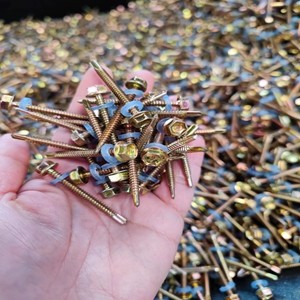lock nut vs lock washer products
Lock Nut vs. Lock Washer Understanding the Differences and Applications
When it comes to fastening applications in various industries, ensuring that components stay secure under vibrational stress is crucial. Two common solutions to this problem are lock nuts and lock washers. While both serve the primary purpose of preventing loosening, they achieve this through different mechanisms and are suitable for different applications. In this article, we will explore the differences between lock nuts and lock washers, their advantages, disadvantages, and the scenarios in which they are typically used.
Lock Nuts
Lock nuts are specially designed nuts that resist loosening when subjected to vibrations. They come in various forms, including nylon-insert lock nuts, jam nuts, and prevailing torque lock nuts. Each type has its unique features and applications.
Nylon-Insert Lock Nuts These nuts have a nylon collar that grips the threads of the bolt as it is tightened, creating friction that helps maintain the nut’s position. This design makes nylon-insert lock nuts highly effective for applications where vibration is a concern, such as in automotive and aerospace industries.
Jam Nuts Featuring a thinner profile than standard nuts, jam nuts are tightened against a regular nut, creating a locking mechanism through friction. They are often used in situations where space is limited but a secure fastener is still required.
Prevailing Torque Lock Nuts Similar to nylon-insert nuts, these feature a deformed thread that provides resistance against loosening. They are often used in high-stress environments and are particularly valued for their durability.
Advantages of Lock Nuts 1. Vibration Resistance Lock nuts effectively resist loosening caused by vibrations, making them ideal for dynamic conditions. 2. Reusability Many types of lock nuts can be reused, which can reduce costs and waste in industrial applications. 3. Compatibility They can be used in conjunction with a variety of bolt types and sizes.
Disadvantages of Lock Nuts 1. Torque Requirements Some lock nuts require specific torque settings to install properly, which can complicate assembly processes. 2. Material Limitations Depending on the type and materials used, some lock nuts may not be suitable for high-heat applications.
lock nut vs lock washer products

Lock Washers
Lock washers, on the other hand, are thin, circular pieces of metal or plastic that are placed under a nut or bolt head to prevent loosening. The most common types of lock washers are split washers, toothed lock washers, and wave washers.
Split Washers These are designed with a split that provides spring tension. When installed, they compress under the nut or bolt head, creating tension that helps keep the fastener secure.
Toothed Lock Washers These have teeth that dig into the surface of the nut and the material being fastened, creating a mechanical interlock that enhances resistance to loosening.
Wave Washers These are designed to exert a spring action, maintaining tension even as the components experience thermal expansion or contraction.
Advantages of Lock Washers 1. Simplicity Lock washers are easy to install and require little special treatment during assembly. 2. Cost-Effectiveness Generally less expensive than lock nuts, they are a budget-friendly option for securing fasteners. 3. Space Efficiency They take up less vertical space compared to lock nuts, making them suitable for compact designs.
Disadvantages of Lock Washers 1. Limited Effectiveness In some high-stress applications, lock washers may not provide sufficient resistance against loosening. 2. Potential for Damage The teeth of toothed lock washers can cause damage to softer materials, which may compromise the integrity of the assembly.
Conclusion
Choosing between lock nuts and lock washers depends on the specific requirements of your application. Lock nuts offer superior vibration resistance and durability, making them ideal for high-stress environments. In contrast, lock washers are simpler and more cost-effective, perfect for less demanding situations. When selecting a fastening method, consider factors such as vibration level, environmental conditions, and ease of assembly to ensure the best results for your project.
-
Top Choices for Plasterboard FixingNewsDec.26,2024
-
The Versatility of Specialty WashersNewsDec.26,2024
-
Secure Your ProjectsNewsDec.26,2024
-
Essential Screws for Chipboard Flooring ProjectsNewsDec.26,2024
-
Choosing the Right Drywall ScrewsNewsDec.26,2024
-
Black Phosphate Screws for Superior PerformanceNewsDec.26,2024
-
The Versatile Choice of Nylon Flat Washers for Your NeedsNewsDec.18,2024










